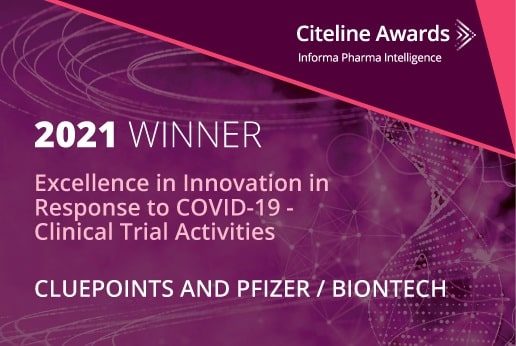CluePoints, the premier provider of Risk-Based Study Execution (RBx) and Risk-Based Quality Management Software for clinical trials, has won the Citeline Award for Excellence in Innovation in Response to COVID-19 – Clinical Trial Activities.
The category recognizes the efforts of an individual, team, or company for innovative work in developing new treatments, technologies, processes, services, or solutions to address the pandemic.
CluePoints took the award for deploying its risk-based quality management (RBQM) software to support the pivotal trial of the Pfizer/BioNTech BNT162b2 COVID-19 vaccine at the Citeline Awards, which were held on Thursday, April 7, 2022, at the Hyatt Regency Boston, MA, USA.
Conducting the crucial trial was highly challenging as it included more than 40,000 people from a broad range of demographics across 150 global sites. To process and protect the integrity of the vast volumes of data generated by the trial, which recruited people at a rate of 5,000 a week, Pfizer worked with CluePoints to deploy an agile, real-time, Risk-Based Monitoring approach.

The central monitoring analytics, led by a core clinical study team and clinical data scientists, focused on an evolving set of study-specific key risk indicators, data quality assessments, and quality tolerance limits. Data was analyzed daily to allow quality issues to be identified and rectified in real time.
Patrick Hughes, Co-Founder and Chief Commercial Officer of CluePoints, said, “It is an absolute honor to receive this award in recognition of our pioneering work, which emphasizes the value of employing an agile, Risk-Based Quality Management (RBQM) approach.”
“Thanks to the implementation of CluePoints’ solutions, the Pfizer/BioNTech product became the first COVID-19 vaccine to receive regulatory approval just 266 days after the pandemic declaration – and hundreds of millions of doses have since been administered around the globe,” says Hughes.
“This study represents a leap forward in how clinical trials are conducted. Our agile RBQM approach allowed Pfizer to increase efficiencies to such a level that it submitted drug applications in record time, with very high levels of quality. In addition, at a time when on-site visits could not take place, central monitoring analytics were extremely valuable in alerting the team to sites requiring attention.”
Hughes added: “It represented a historic moment in time, changing the landscape permanently regarding how clinical trials are conducted.”

















![Sirio Launches Global Research Institute for Longevity Studies [SIA]](https://www.worldpharmatoday.com/wp-content/uploads/2019/09/Sirio-218x150.jpg)


